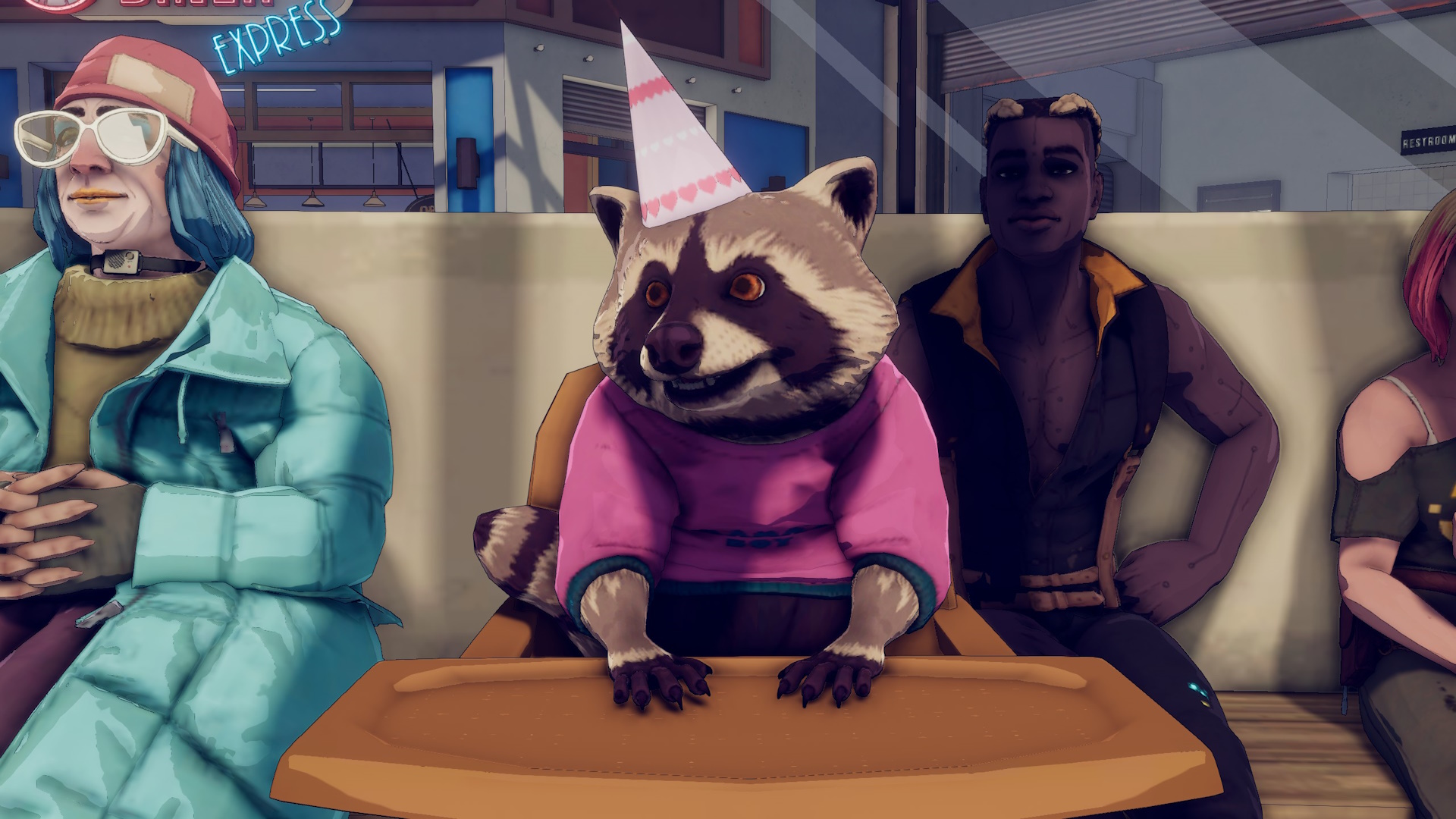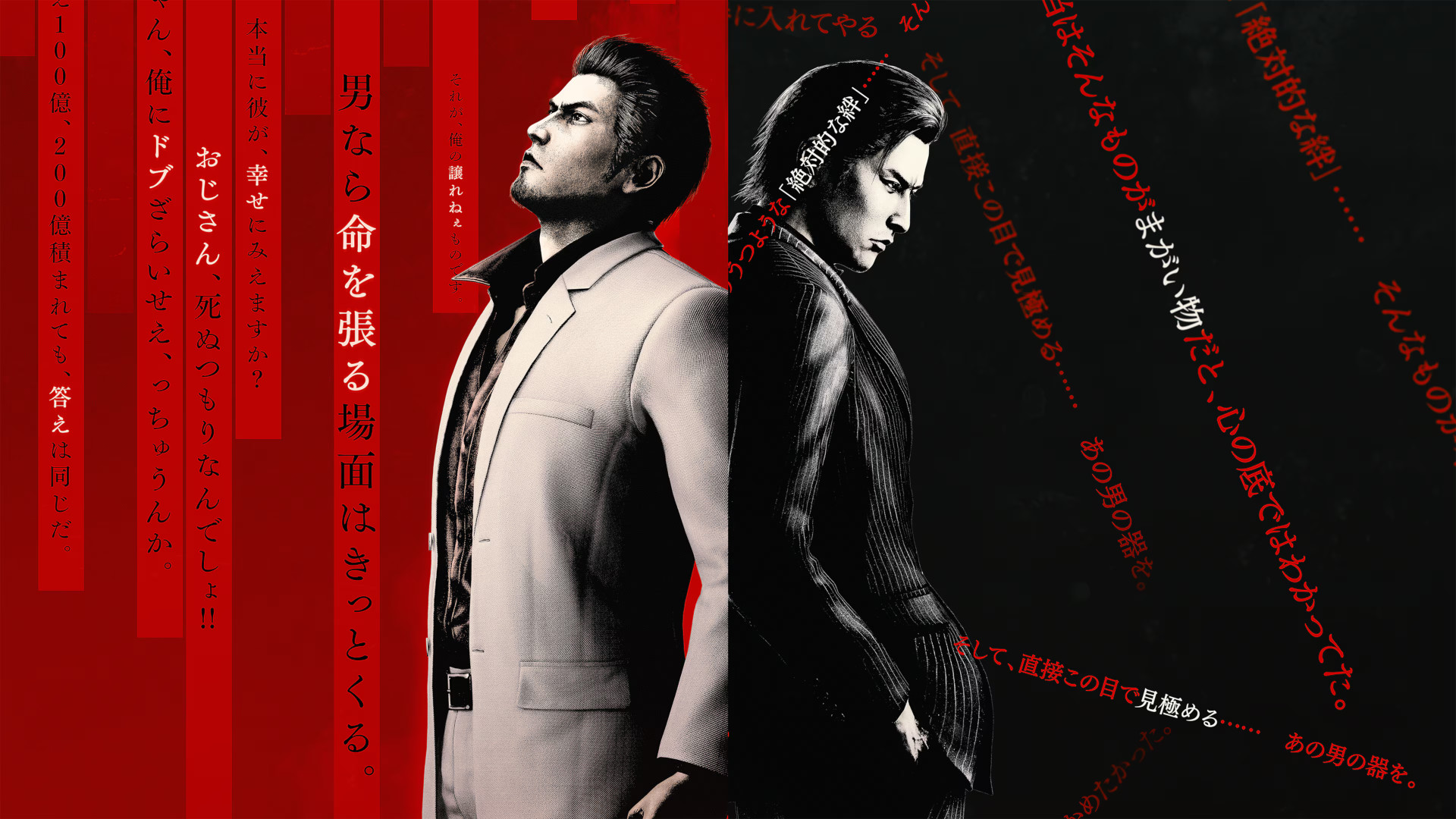GamesRadar+ Verdict
Dustborn is a unique visual novel-style adventure that brings combat and even a rhythm game to its sometimes-intense choice-driven dystopian world, where your decisions matter. But it often gets in its own way, mechanically and otherwise.
Pros
- +
Engaging combat and rhythm game elements
- +
Deep, easy to understand choice-making system
- +
Colorful cast of characters and solid worldbuilding
Cons
- -
Writing varies wildly in terms of quality
- -
Ending and overall message undermines itself
Why you can trust GamesRadar+
Dustborn is a game with a message — many messages even — and it's all impossible to miss. Take, for example, its screed about the power of choice. The events in your life aren't the result of just one momentous choice, but the culmination of many smaller ones. I know this because the main character Pax, when looking over the progression of her life throughout the 15-hour game, says "It was never a single choice. It was every choice, adding up, every step of the way." As if I couldn't figure it out.
Dustborn comes from Red Thread Games and is published by Spotlight by Quantic Dream, both studios fascinated with choice-driven narratives where you have control over the events of the story and the development of characters. Your influence isn't just through branching dialogue either; there are also solid combat and rhythm sections, along with quicktime events, which all work together to make Dustborn a relatively unique entry in the visual novel genre, allowing for greater control and interaction. Combined with its oddly sustained length, the sheer amount of topics and issues it wants to address, and its growing cast of colorful LGBTQ+ characters, it almost lives up to its promise as an epic, political road trip saga about people with superpowers.
However, a lot of its potential impact is undermined by the clunky manner it approaches everything, laying it out in obvious ways that feel like it's talking down to you. I can't fault it for having ambition and a lot to say, but Dustborn loses power when it feels the need to look straight at the camera and make sure you understand it, hammering home points over and over again.
More than talking
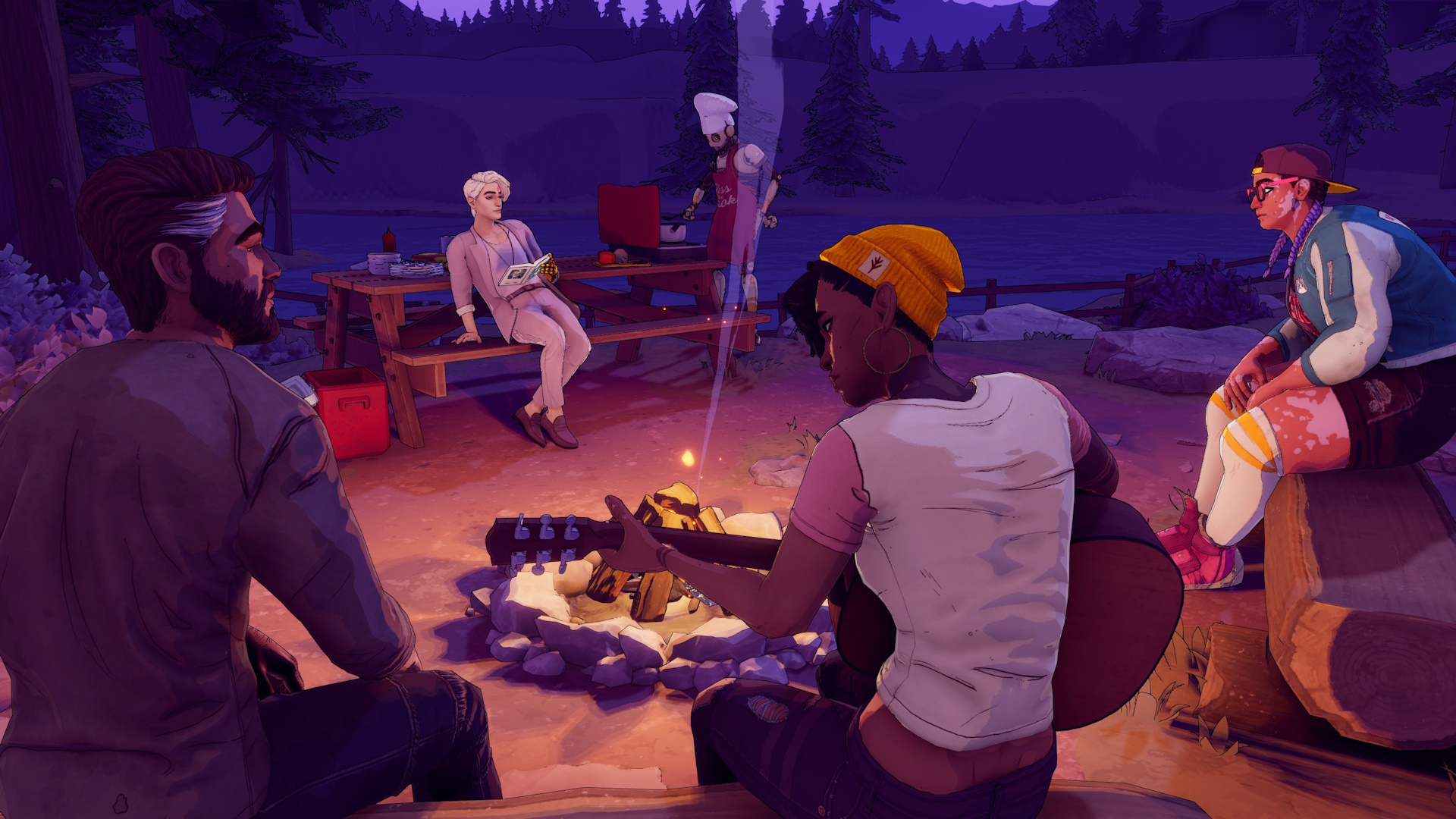
Release date: August 20, 2024
Platform(s): PC, PS5, PS4, Xbox Series X, Xbox One
Developer: Red Thread Games
Publisher: Spotlight by Quantic Dream
Dustborn is first and foremost a visual novel of sorts where you play as Pax, who teams up with a group of friends and strangers to deliver a valuable package across the Republic of America to a resistance movement in Canada while pretending to be a touring punk band called the Dustborn. All of this is to hopefully be free of the oppression and danger of a fascist, broken America. So you'll have to do your best to navigate your group through different parts of the country by making decisions on how to handle situations. Some just require you to get through a conversation, but others are much larger.
Take, for example, the first in the game, which involves getting pulled over by a cop. You can talk your way out of it normally, or give the cop a bit of a… push. See, Pax and many of the other characters have powers called Vox, which allows them to use their voice to influence their bodies or the people around them. Pax's specifically influences people negatively, forcing them to freak out or put themselves in danger. So after regular talk with the cop doesn't go well, you're given the option to use your Vox. It works, but not in the way you hope.
The general plot unravels in predetermined ways, but your choices can affect if your actions come back to bite you later. The addition of your Vox also allows you to sometimes find the easy way through a situation, but then a character might feel taken advantage of. Whether you rely on what you can do as a person or what your ability does is a constant bit of tension, and sometimes, the game will throw a timer at you to make it more stressful. Despite this being a dystopian setting with tons of dangerous threats, this is a story about people, so your most impactful choices involve how you interact with others and help them develop.
Each of the main members of your party have three possible paths they can take, and certain choices can lead them down one. For example, your sister Ziggy can remain defeatist, or she can become an idealist if you approach your shared trauma in a specific way. There is no "correct" path either, so even when I thought romancing your party member Noam was the way to go, it didn't turn out like I planned. You can keep track in a separate menu, and you'll see a little icon in the top left corner when a decision can impact a path. There is a lot going on here, with plenty of surprises as the characters and mysteries of the world unravel, but the biggest twist in Dustborn is that your carefully selected choices might not lead to the best outcomes.
Weekly digests, tales from the communities you love, and more
But there are other systems at play. First, there's combat, complete with a small upgrade tree for your main weapon — a magnetic bat you can use like a boomerang. There's also a whole rhythm game in here, where you have to hit the buttons on your controller or keyboard at the right time to play one of your songs well at a performance. Finally, you can capture hidden energies called Echoes that are scattered throughout each major map. You can then use them to learn different Voxes for conversations and, yes, even battles.
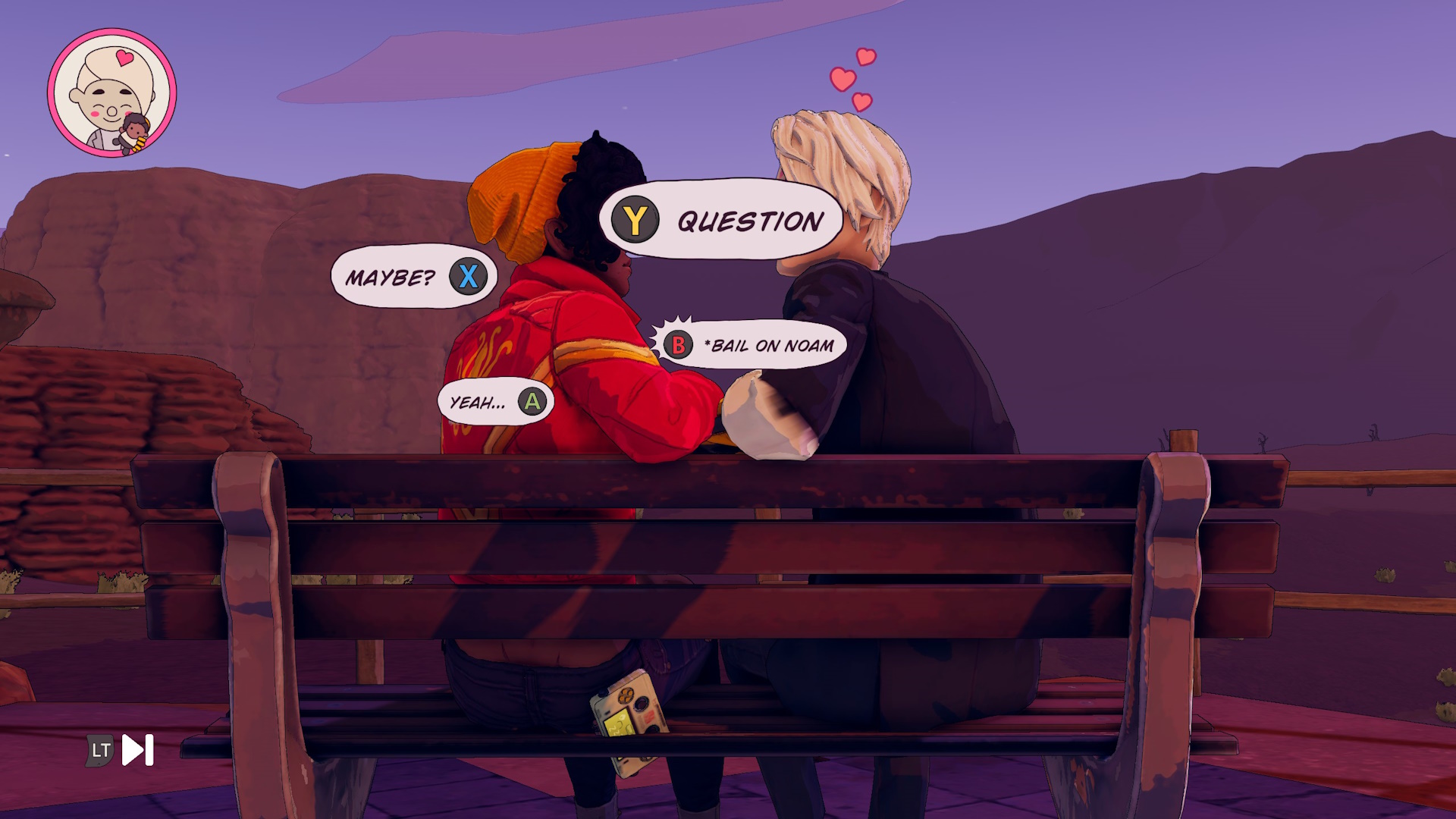
Dustborn loses power when it feels the need to look straight at the camera and make sure you understand it
Neither of these systems are complex or engaging in a way beyond just being there to break up the monotony of quicktime events and choice-making, but they work. Combat isn't anything groundbreaking, but it's smooth, easy to master, and has just enough depth that you'll have to do more strategizing as you go. You can whack your foes, throw the bat to make hits from a distance or knock them from the sky, or make a larger impact with two special attacks that build up as you land more hits. One is a taunt that requires you to press a random series of inputs to complete successfully, and the other is your Vox, which you can use for varying effects, like convincing enemies they're on fire or forcing them to attack each other. Most of the strategy in battle comes from this area in particular, since you have to decide which Vox ability will work best in a situation. Many don't work on robots, for example, but some you learn later can have some effect.
Similarly, the rhythm game elements are basic but get the job done. You're a band after all, and you need a way to successfully perform. It's like a simplified Guitar Hero round: You hit one of four buttons as they scroll by on your screen during a number, and when you've hit a high enough streak, you can activate a bonus to rock out. The original songs you have to perform are varying levels of difficulty, but you get to choose the song in each instance, so you can avoid the tougher ones if you want.
There's enough here though that you can feel tension about succeeding. You have to somehow convince people that you're a real traveling band, so having some way to potentially fail is part of the program. During your first performance, you have to convince some border guards that you're a real band, and how well you do can influence whether you get through security or not. I did… all right — I got by, but the guards made fun of us as they waved us through. (Look, nobody said you had to be a good band.)
All these systems work together enough to make Dustborn feel more dynamic than other visual novels. The combat and rhythm sections are more fast-paced than the conversations, but don't feel out of place; everything works together to make you feel like you have more control over the narrative. Granted, there aren't outcomes where you'll fail a fight, and destroying a performance doesn't mean you somehow become a bigger threat to authoritarianism, but it's able to inject life into what could easily be a passive experience.
Message received
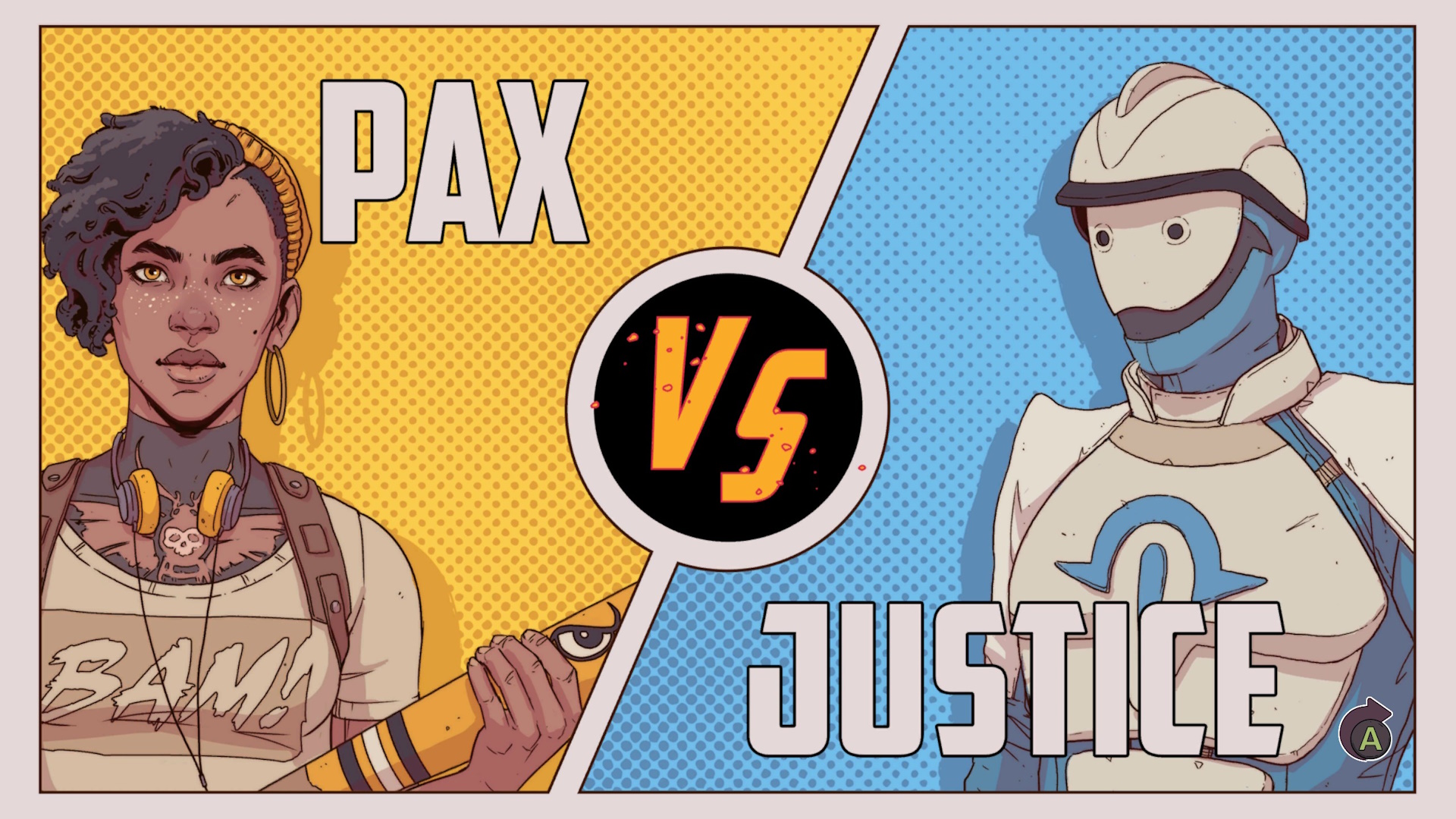
Dustborn takes place in a world gone to hell, and the developers put a lot in to ensure you know it, with details like: internment camps for children, underground library networks slowly dissipating, the growing presence of robots, and the presence of Echoes, which use disinformation to fill people with paranoia and anger. The developers also provide reasons for why this all exists, even if the historical event that signaled this alternate history is that Jackie Kennedy got assassinated instead of JFK (don't worry about it). You might not believe that all of it could stem from one changed assassination, or that any of the technologies or events could happen, but it's something, and the game follows its own internal logic well.
This is a solid setting for the political themes Dustborn wants to tackle, which concern our current era and the threat of rising authoritarianism, but the way it does so can sometimes come off clunky or obvious. The dialogue can be sharp, witty, and emotionally grounded, but those moments are overshadowed by the game beating you over the head with over-the-top winks at the camera or grating platitudes. The disparity between a funny running gag about zombie robots (zombots) and a new Vox ability called "Cancel" that has you shouting "You've been canceled!" at enemies induces whiplash. How am I supposed to balance the game that lets you sing "Happy Birthday" to an adorable raccoon named Mr. President with the one that introduces a little person at something called the Yellow Brick Road Motel?
This isn't just about dialogue either. The Echoes spread what Pax calls disinformation, and while what you hear from them in game is mostly garbled, you can make out snippets about how the media is lying to you or that the deviants (one of the words for people with Vox) are spreading their illness through the air. You're running from two groups: The Puritans, who are against your kind, and Justice, the military corps that rule the Republic. Dustborn is many things, but it's not subtle.
The game's overall message is about the power of words, something it will spell out for you any chance it gets. Why are these underground libraries so important? Because they spread good information. Why is this a world where people have abilities powered by voice? Because their words literally have power. This would all be easier to digest if the game didn't basically reach through the screen to ensure you understood it. Worst of all, it brushes aside many late-game moments instead of offering explanations or answering burning questions to make the point that you don't need to personally take down tyrannical governments to make lasting change in society. It's nice to say that spreading the correct words will get the job done, but not when Dustborn spends 15 hours setting up a much larger story only to cut itself off at the last minute and shrug it all away.
Yet, there's something genuine about it, regardless of how embarrassing it feels to hear a character scream "Girl power!" during battle. How you go about making decisions, interacting with others, and what kind of message you put out into the world is more important than making some spectacular display of violence or hope, and that is lovely. It's also unabashedly queer – complete with a coming out story involving an agender robot – is gorgeous to look at, features a raccoon with a sweater named Mr. President, and is overall engaging to play. Dustborn's execution could be cleaner, and it could avoid undermining itself just to get its point across, but it's nice to play a game with something to say, even if it struggles to do it.
Dustborn was reviewed on PC, with a code provided by the publisher.

Carli Velocci is an editor and journalist with over 10 years covering video games, technology, and culture. You can see their work all over the internet, including Polygon, Digital Trends, IGN, Game Developer, and many, many others. When not on the clock (which is sort of always), you can find them petting cats for serotonin, playing a horror game/Stardew Valley, or going cozy with tea and a book.
